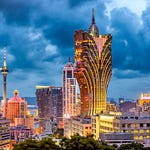Welcome to East West Hurricane! 🌪
We update you on the most essential news from Asia in tech, media, and business—the things you need to know that you probably haven’t heard in Western media.
Follow us on Twitter and Instagram! ⚡️
Ant Group Makes It Official, Time For An IPO 📈
This week, Ant Group filed for its initial public offerings (IPOs) in Hong Kong and Shanghai, with a goal to raise $20 Billion and an estimated company valuation of over $200 Billion. This will make Ant the biggest IPO of the year and likely the biggest IPO of all time. Ant Group owns Alipay, a fintech and digital payments platform that has over one billion users, $15 Trillion in transactions processed last year, and $10 Billion in revenue throughout H1 2020. It’s pretty much the premier fintech company of China and possibly the whole world.

Funnily enough, the previous record holder for ‘world’s biggest IPO’ was Alibaba, the company founded by Jack Ma that also spun out Ant Group. Unlike Alibaba however, Ant has decided not to list on a US Stock Exchange. Ant is a prime example of a company that is literally one of the world’s biggest and influential, but most people in the West are unaware of what the company does. This cultural blindspot places Ant in a position to take advantage of the world’s fastest growing emerging markets, which are in places like Asia.
Chinese Reality TV Returns Post-Covid 🥤
A popular type of program in China is Reality TV shows. While the regular TV season was delayed because of the coronavirus, things are now relatively back to normal. With this reopening comes new opportunity for brands sponsoring these TV shows. International beverage brands (alcoholic and non-alcoholic) are the most popular sponsors of Chinese reality TV, including Pepsi, Coca-Cola and Absolut Vodka. Major luxury automotive brands like Mercedes-Benz and BMW are also sponsoring China’s biggest reality TV shows.

I’m currently watching Fourtry, which is a popular Chinese reality TV show about celebrities who try to create a fashion boutique in Tokyo. Compared to Western reality TV shows, Fourtry strikes me as more in-your-face with the sponsorship, video production, and commercialisation. Having worked in marketing, advertising, and media across several continents, I have noticed the cultural differences in how customers respond to advertising. In China, brand partnerships and sponsorships seem more direct and explicitly selling.
China Mobile’s Strategy for Gen-Z 🗼
China Mobile is one of China’s largest telco companies and their new product M-Zone is geared towards Gen Z audiences. To appeal to this target audience, M-Zone has been promoting their 5G services and AI by partnering with streaming platform Mango TV to celebrate youth culture through interactive content. M-Zone worked with popular Chinese influencers, used virtual reality/augmented reality (VR/AR), and created tons of content they streamed across several digital platforms.

All companies targeting younger audiences next to adjust their marketing strategy. Whether in the East or West, reaching younger audiences requires your brand to understand the latest technology, influencers, and interactivity. China Mobile’s latest campaign for M-Zone is very futuristic and embraces some of these cutting-edge trends for the sake of relating to younger audiences. It’s pretty forward thinking and I don’t see this type of marketing from Western telcos.















Share this post